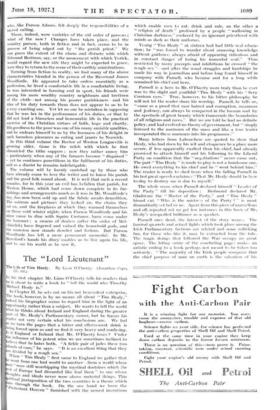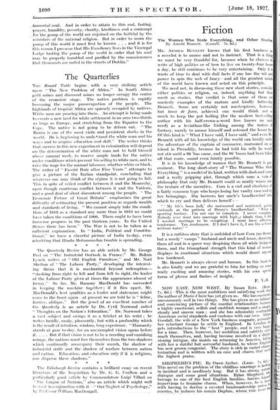The "Lord Lieutenant"
e Life of Tim Healy. By Liam O'Flaerty. (Jonathan Cape. 12s. ed.).
Ix- his first chapter Mr. Liam O'Flaerty tells his readers that he is about to write a book to " tell the world who Timothy Michael Healy is."
In Chapter IL he sets out on his not benevolent enterprise. he hook, however, is by no means all about " Tim Healy," ndeed his biographer seems to regard him in the light of an aportunity rather than a subject. He wants to tell the world what he thinks about Ireland and England during the greater )art of Mr. Healy's Parliamentary career, but he leaves his eader not very certain what his conclusions are. We feel
we turn the pages that a bitter and effervescent drink is jag forced upon us and we find it very heavy and confusing. s it England or Ireland that Mr. O'Flaerty loves ? Under he influence of his potent wine we are sometimes inclined to lkve that he hates both. "A fickle pair of jades these two lands of ours," he says. " It is an excellent thing that they -ere divided by a rough sea."
When " Tim Healy " first came to England we gather that pe went from one bad world to anotherfrom a world 'ahem inen "were still worshipping the mystical doctrines which the est of Europe had discarded like foul linen " to one whose Noughts and ideals never were above material things. This ritual juxtaposition of the two countries is a theme which _IN through the book. On the one hand we have the Protestant Heaven " furnished -with the newest inventions
which enable men to eat, drink and rule, on the other " religion of death " professed by a people " wallowing in Christian darkness," enslaved by an ignorant priesthood with minds as dark as their. unifonm.
Young " Tim Healy " at sixteen had had little real educa- tion; he "was forced to wander about amassing knowledge without guidance, always afraid of appearing ridiculous and in constant danger of losing his immortal soul." Thus restricted by many precepts and inhibitions he crossed " the rough sea "—and after the usual struggles and hardships lie made his way in journalism and before long found himself in company with Parnell, who became and for a long while remained his chief and hero.
Parnell is a hero to Mr. O'FItterty more truly than he ever was to the slight and youthful "Tim Healy" with his " fiery Corsican eyes." True, however, to his bitter philosophy he will not let the reader share his worship. Parnell, he tells us, "came as a proof that race hatred and corruption, meanness and jealousy, can always be conquered in the human soul by the spectacle of great beauty which transcends the boundaries of all religions and races." But we are told he had no definite policy, and had evolved no theory of government, but " simply listened to the murmurs of the mass and like a true leader incorporated these murmurs into his programme."
Many letters front Labouchere arc quoted to show that Healy, who had risen by his wit and eloquence to a place more secure, if less apparently exalted than his chief, had already promised to attach himself and his following to the Liberal Party on condition that the "negotiations" never came out. The part " Tim Healy " is made to play is not a handsome one. He owed even thing to his chief and he " went behind him." The reader is ready to shed tears when the falling Parnell in his last great speech exclaims : "That Mr. Healy should be here to-day to destroy me is due to myself."
The whole scene when Parnell declared himself •' Leader of the Party " till his deposition ; Redmond declared Mr. Gladstone the " Master of the Party," and " Tim Healy " hissed out " Who is the mistress of the Party ? " is most dramatically set befire us. Apart from this piece of marvellous and oft repeated wit we get few instances in this book of Mr. Healy's unequalled brilliance as a speaker.
Parnell once dead, the interest of the story wanes. The farcical quarrels and actual fights which took place among the Irish Parliamentary factions are related and some rollicking fun, for those who like it, may be extracted from the talc. The. tragic doings that followed the War occupy no great space. The biting satire of the concluding pages make; an artistic ending to at book perhaps not meant to be taken ton seriously. " The majority of the Irish people recognize that the chief purpose of man on earth is the salvation of his
immortal-soul. And in order to attain to this end, fasting, prayer, humility, poverty, charity, kindliness and a contempt for the pomp of the world are enjoined on the faithful by the ministers of the national religion. But in order to scorn the pomp of this world it must first be known . . . and it is for this reason I presume that His Excellency lives in the Vieeregal Lodge tasting the pomp of the world in order that his soul inn be properly humbled and purified by the consciousness that thousands are unfed inthe streets of Dublin."



























































 Previous page
Previous page